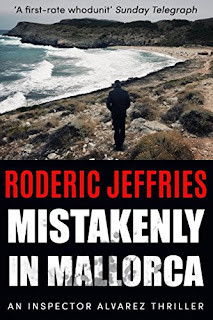I
almost quit Mistakenly
in Mallorca
about the halfway point,
which
would
have been a mistake. It was when the protagonist, John Tatham, whom I
liked, made the kind of dicey choice in a dicey situation
protagonists make in traditional noir stories. The kind with the
gloomy tone that foreshadows a bad ending. Whether the choice is made
with a motive of greed, adultery, or some other self interest, such
as vengeance, doesn't matter so much as the knowledge I have that the
character I identify with is on the road to perdition.
Ordinarily
I prefer uplifting stories to such downers, and even though
Mistakenly
in Mallorca
starts out with Tatham's fiancée
being murdered by a gangster the tone of doom-bound temptation was
absent. Tatham seems a man of character, whose small rented farm is
failing. He leaves England to stay with eccentric great-aunt Elvina
on the Balearic island of Mallorca. There, amid the beautiful
Mediterranean surroundings just off the Spanish coast, he succumbs to
one of these temptations. Elvina is killed apparently falling from a
balcony at her home. Most inopportune for her nephew, who stands to
inherit a fortune via the aunt from her declining,
ninety-one-year-old godfather in England who is expected to die at
any moment. His sole beneficiary, Elvina, had promised to alter her
will to pass the legacy to Tatham should the godfather die first.
She’d said this would stake him to starting up a new farm,
something Tatham had made obvious to her he dearly wanted to do.
So.
The dilemma. With no way now to learn when the godfather might die,
but believing his death was imminent, Tatham has to decide either to
notify police immediately of Elvina’s death, thus presumably losing
any claim to the inheritance, or else to hide the body until he knew
for certain the old gent had died, and then report his aunt missing.
He chooses door number two, leaving me stupefied.
As
this was the first in a series of some three dozen crime novels
featuring Inspector Alvarez, I knew the rest of Mistakenly in Mallorca would crawl tediously toward Tatham's shameful demise--unless Alvarez was the
Mallorquin version of Inspector Clouseau, which I doubted, as the
book thus far showed no signs of being a farce, or something else was
going on here new in my admittedly limited exposure to genre crime
novels. I waited until I was certain farce was not involved, although
Alvarez gave me some farce-like clues when he entered the novel at
the halfway point.
At
first glance, in appearance and manner, he struck me as resembling
more Peter Falk’s Columbo than Clouseau. He makes it clear to us he
resented being assigned to investigate Elvina’s death when her body
turns up at the base of a cliff ten days after her death. He actually
feared a promotion that would take him away from Lueso, his beloved
community.. “He’d reminded his superiors (in Palma) that he
existed,” we are told. “If he went even farther and uncovered and
solved a murder, he might, God knows, even at this late stage be
given promotion and be moved from Llueso. The thought so distressed
him that he bent down and opened the bottom drawer of the desk,
brought out a litre bottle of Fundador, and poured himself out a
large drink.”
But
he plods along finding clue after clue left by Tatham’s
carelessness, and finally sends the
body,
which
Tatham had kept in the freezer until he learned of the godfather’s
death, for an autopsy. Alvarez is crushed when the results are not
consistent with the purported accidental fall from a cliff:
“Now,
there was no avoiding fate. People would be down from Palma, poking
their noses into everything, looking everywhere, questioning
everyone, and his previous privacy would be shattered once and for
all. The English, he thought miserably, would destroy Heaven if, by
some grave oversight, any of them were ever allowed to enter.”
After
a couple of yawns and some disgusted grunts I decided not to abandon
the novel, and plodded ahead along with Alvarez. I tried to distance
identification with Tatham, yet found myself cringing whenever
Alvarez’s plodding brought him closer to an undeniable conclusion
Elvina had been murdered.
I’ll
skirt the rest of the plot, because it surprised me some, and I don’t
wish to spoil the surprise for anyone else. I will note one thing
which might be taken as a clue: At some point Tatham reflects on what
appears to be a distinction between the justice apparatus in England,
which he blames for his fiancée’s death, and that on Mallorca.
Watching this play out, combined with Jeffries’ insightful capture
of the various components of Mallorquin society and the eye-friendly
countryside they inhabit, kept me entertained as the narrative eked
along.
I
spent some time on that island and neighboring Ibiza in 1970, and
this novel brought memories to the forefront. The book was published
in 1974.
A
subplot involves
an English wheeler dealer trying to sell his mansion to a wealthy
German. He
baits
the prospect with a forged Renoir painting he’d commissioned from
someone
who specializes
in such forgeries. The unnamed forger may have been inspired by
Hungarian
art forger Elmyr de Hory, who had been a neighbor of literary forger
Clifford Irving on Ibiza and became the subject of Irving's 1968
book Fake!,
and who Irving credited as inspiring him to write the fake
autobiography of reclusive billionaire
Howard
Hughes in the early ‘70s. Irving, his wife, and his researcher
spent
some time behind bars for that world-famous caper.
Sad
to say I didn’t
run into either Hory or Irving during my brief stay on the island,
which
ended when
I and
about a dozen other
young
travelers were arrested sleeping in the several cliffside caves
overlooking the sea. I later learned an international wire service
reported our
arrest (without our names, so I can’t prove my involvement—for
better or worse) but I have not seen the story.
I
do plan on reading more of the Alvarez series, to
which I thank fellow crime fiction blogger Margot
Kinberg
for introducing
me.
[For
more Friday's Forgotten Books check the links on Patti
Abbott's unforgettable blog]




I've always meant to try one of the Inspector Alvarez books, but I never have. I'm going to have to try harder!
ReplyDeleteI've just started #2 in the series, and liking it!
DeleteYou and Margot both have me intrigued by this author. I will be looking for a copy.
ReplyDeleteThere are Kindle versions for some of them, Tracy.
Delete